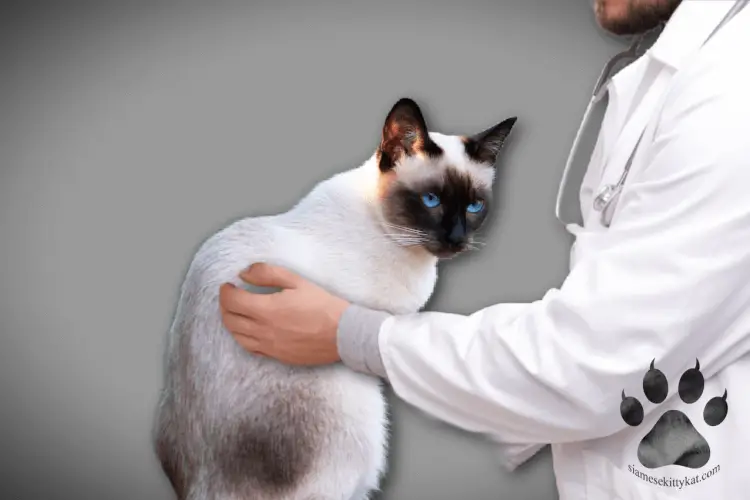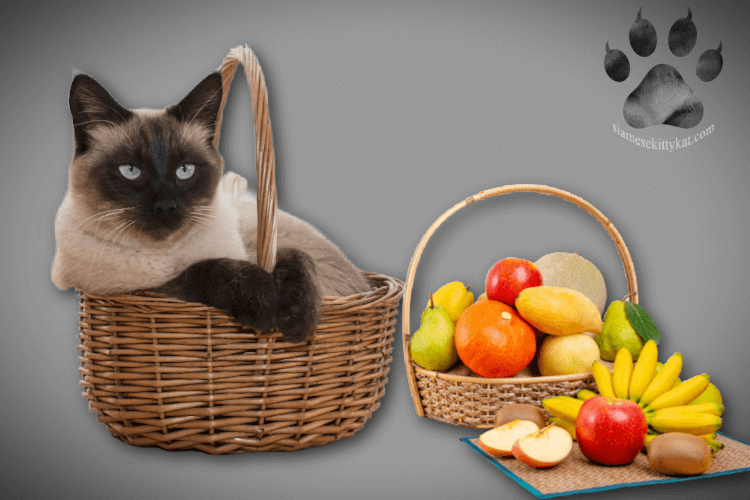While watermelon may be a favorite summer snack for humans, you may wonder if this is safe for your Siamese cat.
Siamese cats can eat watermelon, and it turns out many of them enjoy it!
However, it’s not advisable to feed watermelon to your cat on a regular basis. You should not feed seeds or rind, as these parts of the fruit may be toxic to them. The seeds in watermelon can also be a choking hazard for cats.
Serve your cat watermelon in small portions as a treat instead.
I’ll share other fun facts in this article, so continue reading to learn more!
Can Siamese Cats Eat Fruits?
Siamese cats have a delicate stomach, so be careful about what you feed them. Fruits can be a part of a balanced diet for a Siamese cat, but there are a few things to keep in mind.
Feeding your cat too much fruit can cause digestive problems, so it’s important to offer it in moderation. When picking out fruits for your cats, go for those low in sugar. Avoid those with seeds or pits, as these can harm your cat.
Start with small amounts when introducing fruit into your cat’s diet to see how they react .
Batman always starts meowing as soon as he sees me cutting up a piece of watermelon. I always give him a little bit of whatever I’m eating, and he always seems to enjoy it.
I find him sitting in the kitchen, staring at the fruit bowl sometimes. I’ll ask him what he’s looking at, and he’ll give me this cute little meow. He’s waiting for me to give him a treat.
It’s quite a sight to behold. Batman always looks like he’s in ecstasy when he’s eating his favorite food.
What Fruits are Toxic to Cats?
Cats are obligate carnivores, meaning that they need animal protein to survive. However, this doesn’t mean they can’t eat fruits and vegetables.
While cats don’t derive much nutritional value from plant-based foods, some fruits are safe to eat. However, some fruits are toxic and can make your cat very sick. These include grapes, raisins, and currants, which can cause kidney failure.
The exact mechanism by which these fruits cause toxicity is not fully understood. Experts say they interfere with the metabolism of some amino acids in the body.
Symptoms of toxicity can include gastrointestinal upset and urinary problems. In severe cases, toxicity can lead to death.
Other harmful fruits for cats include citruses like oranges, lemons, and limes.
If you want to give your cat a little treat, it’s best to stick to cat-safe fruits like bananas, apples, and watermelons.
What Should You Do If Your Cat Eats a Toxic Fruit?

It is crucial to seek professional medical help immediately if your cat eats toxic fruit. The toxicity level will depend on the type of fruit eaten and how much your cat consumes these fruits.
It’s a good idea to bring the vet any leftover containers or packaging of the fruit you fed your pet. These can help them more accurately assess the toxicity and provide proper treatment.
You can also call the ASPCA Animal Poison Control Center at (888) 426-4435 for guidance on how to proceed.
Batman is a fruit connoisseur, but he can be a bit of a troublemaker. A few months ago, Batman ate a toxic fruit. I don’t know what kind it was, but it made him very sick. He was vomiting and had diarrhea for days. I was really worried about him.
I took her to the vet. Luckily, he was okay, and he recovered quickly.
I’ve kept a close eye on him since then. I ensure he doesn’t eat plants or fruits that could harm him.
How Can You Prevent Your Cat from Eating Toxic Fruits?
Here are a few simple steps to prevent your cat from eating toxic fruits.
- Take your cat away from areas where toxic fruits are growing. Ensure your cat does not have access to your backyard, if in case you have one. Keep your cat indoors if you live in an apartment.
- Educate yourself about which fruits are toxic to cats. The most common toxic fruits are grapes, raisins, and citrus fruits. Make sure these fruits are out of your cat’s reach if you have them in your home.
This may mean keeping them off counters and table tops where you store these fruits.
- Be vigilant about what your cat is eating. Get rid of fruits that you know are toxic to your cat and give him a safe, alternative food instead.
- You can train your cat to stay away from toxic fruits. You can teach your cats that certain fruits are off-limits. You can reward them with treats when they stay away from these fruits.
Which Fruits Can Cats Eat?
Some fruits are safe for cats to eat, including bananas, cantaloupe, and watermelon.
These fruits are a great source of hydration for cats and can help satisfy their sweet tooth.
While these fruits are safe for cats to eat, they should not make up most of their diet. Instead, focus on feeding your cat a high-quality animal-based diet. This will ensure they are getting the nutrients they need.
List of Fruits Siamese Cats Can Eat

Apples: Apples are a popular fruit for people and pets alike, and Siamese cats are no exception. While not all cats enjoy the taste of apples, those who do can reap the benefits of this healthy fruit.
Apples are nutritious fruit that contains fiber and vitamins A and C.
This fruit can also help promote healthy skin and coat. Plus, the crunchy texture can help keep your cat’s teeth clean.
Bananas: Some people may give their Siamese cats bananas as a treat. They are a good source of potassium and dietary fiber, which can help with digestive issues.
However, it’s important to feed bananas to Siamese cats in moderation. Too much sugar can lead to weight gain, so be careful not to overdo it with the treats.
Cantaloupe: Many people don’t know that cantaloupe is a great treat for Siamese cats. The sweetness of the fruit appeals to their palate, and the juicy flesh is a great source of hydration. Plus, the melon’s high vitamin A content can help keep their coat healthy and lustrous.
Remove the seeds and the rind before giving them to your kitty. Offer up moderate portions as part of a nutritionally-balanced diet.
Watermelon: Watermelon is a healthy, low-calorie treat for cats and can even help them stay hydrated in the heat. Many cats enjoy the sweetness of watermelon. This fruit can also help them regulate their body temperature.
Watermelon is a perfect treat if you have a Siamese cat because it’s rich in lycopene. It is known to help Siamese cats maintain their coat color.
Pear: Pears are packed with essential nutrients for a cat’s health, including vitamins C and K, copper, and fiber. They also contain quercetin, which has anti-inflammatory and anti-cancer properties.
Strawberries: Siamese cats love strawberries! Not only are they a delicious treat, but the reddish color also appeals to these kitties.
Strawberries are an excellent source of vitamin C for cats and help boost the immune system.
Check the strawberries for freshness. See if they’re free of pesticides and chemicals. Then, cut the strawberries into small pieces, so your cat can easily eat them.
Blueberries: Blueberries can help promote urinary health in cats, since these are a natural diuretic.
They are also a low-sugar fruit, which is essential for cats who are prone to diabetes. Because they are so small, blueberries are the perfect size for a cat to snack on.
Mangoes: The high vitamin A levels in mangoes help keep Siamese cats’ vision healthy. Mangoes help to boost their immune system and keep the coat healthy. They can also provide the energy needed for playtime.
Apricots: Apricots are rich in vitamin A, essential for proper eye health in cats. Apricots also contain natural fiber, which can help with digestion. Be sure to take the pit out before giving them to your cat.
Cranberries: Cranberries are a great addition to your Siamese cat’s diet. These fruits contain antioxidants and vitamins to boost your cat’s immunity.
Cranberries also have anti-inflammatory properties that can help relieve any existing health conditions.
Raspberries: Raspberries are a good source of fiber. This can help to keep your cat’s digestive system running smoothly. The antioxidants found in raspberries can help protect against several illnesses and diseases.
Peaches: Peaches can be a healthy and tasty treat for your feline friend although they are not necessarily part of a cat’s diet. Remove the pits and other hard bits before giving them to your cat.
How Often Should Siamese Cats Eat Fruits?
Siamese cats can also enjoy occasional treats of fruits besides eating a diet of dry and wet food. However, limiting how often your Siamese cat eats fruits is important. They can easily become obese if they consume too many calories.
Aim to give your Siamese cat fruits and vegetables no more than once or twice a week. Always monitor their weight to ensure they stay healthy.
Conclusion
Eating fruits is natural for cats, but you need to be aware of the potential dangers they can bring. Some can irritate their stomachs, while others can prove fatal.
Keep your feline friend away from the more toxic fruits. Seek medical attention immediately if your cat does one of these toxic fruits.
We gathered all the health tips tailored towards maintaining your Siamese cat’s optimal well-being. Check it out here: Siamese Cat Health: A Complete Guide
